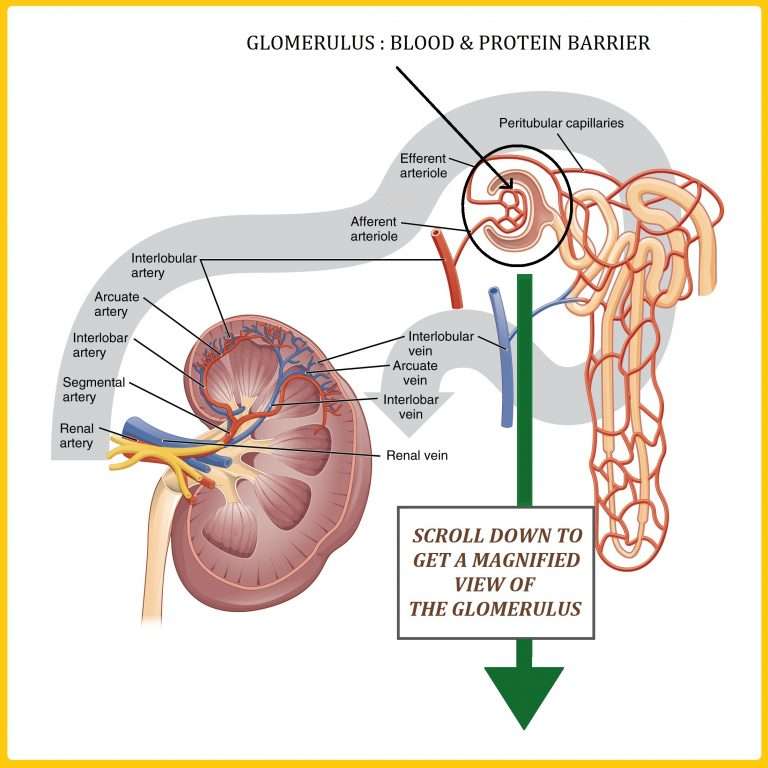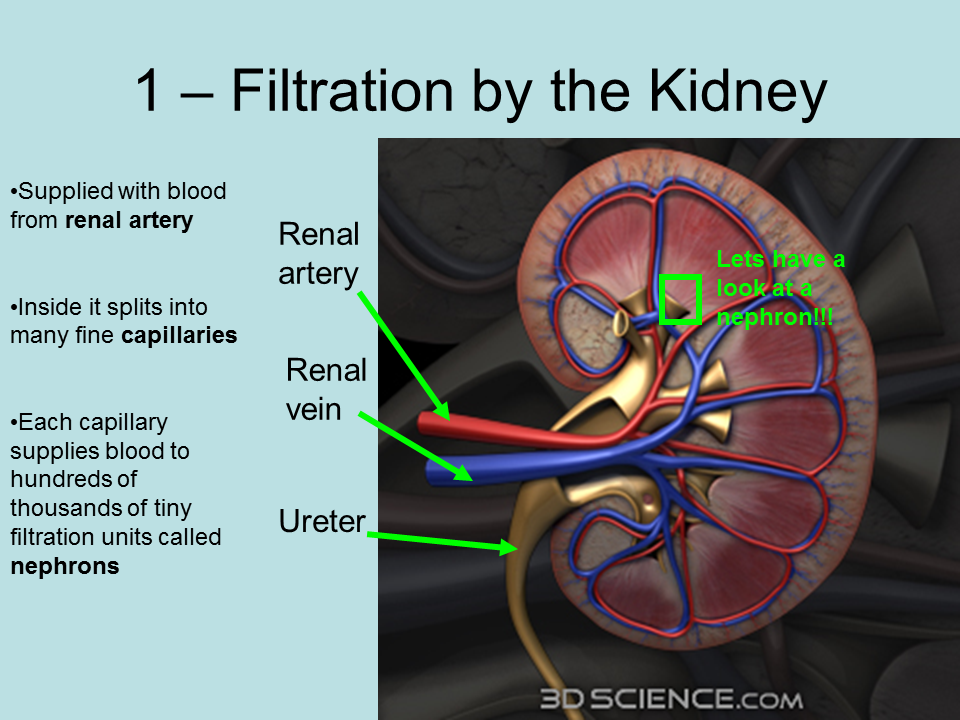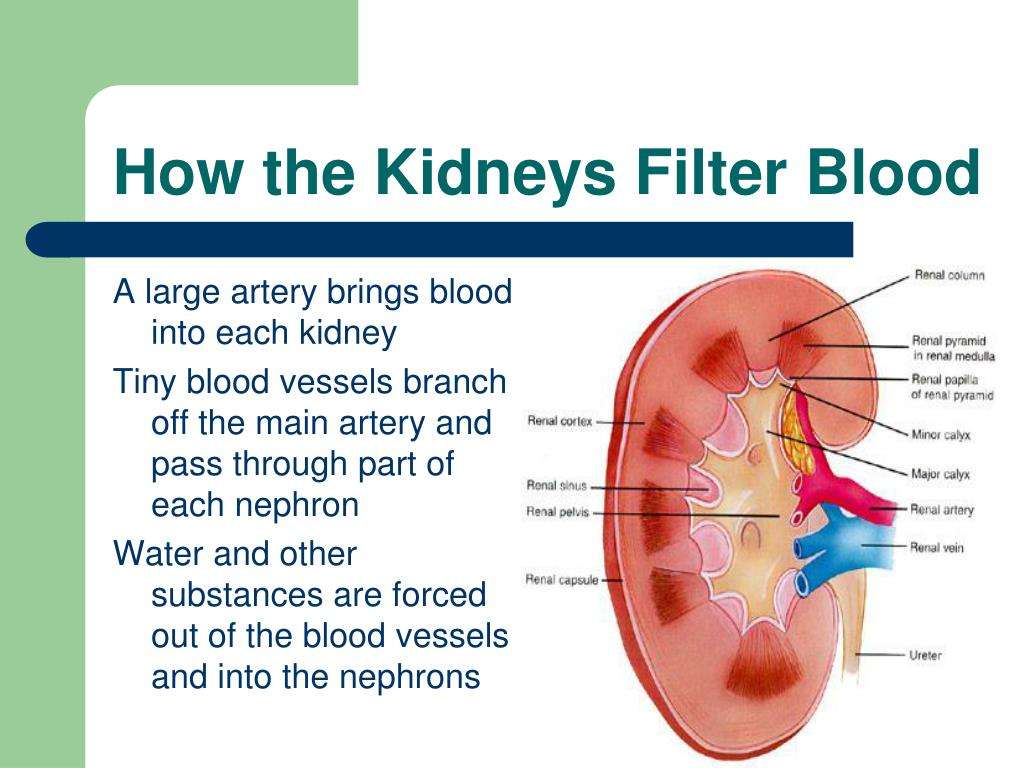Where Are The Kidneys And How Do They Function
There are two kidneys, each about the size of a fist, located on either side of the spine at the lowest level of the rib cage. Each kidney contains up to a million functioning units called nephrons. A nephron consists of a filtering unit of tiny blood vessels called a glomerulus attached to a tubule. When blood enters the glomerulus, it is filtered and the remaining fluid then passes along the tubule. In the tubule, chemicals and water are either added to or removed from this filtered fluid according to the body’s needs, the final product being the urine we excrete.
The kidneys perform their life-sustaining job of filtering and returning to the bloodstream about 200 quarts of fluid every 24 hours. About two quarts are removed from the body in the form of urine, and about 198 quarts are recovered. The urine we excrete has been stored in the bladder for anywhere from 1 to 8 hours.
What Conditions And Disorders Can Affect The Kidneys
The kidneys perform several important functions within the body. Many different disorders can affect them. Common conditions that impact the kidneys include:
- Chronic kidney disease:Chronic kidney disease may lessen your kidney function. Diabetes or high blood pressure usually causes CKD.
- Kidney cancer: Renal cell carcinoma is the most common type of kidney cancer.
- Kidney failure : Kidney failure may be acute or chronic . End-stage renal disease is a complete loss of kidney function. It requires dialysis .
- Kidney infection : A kidney infection can occur if bacteria enter your kidneys by traveling up your ureters. These infections cause sudden symptoms. Healthcare providers treat them with antibiotics.
- Kidney stones:Kidney stones cause crystals to form in your urine and may block urine flow. Sometimes these stones pass on their own. In other cases, healthcare providers can offer treatment to break them up or remove them.
- Kidney cysts: Fluid-filled sacs called kidney cysts grow on your kidneys. These cysts can cause kidney damage. Healthcare providers can remove them.
- Polycystic kidney disease: Polycystic kidney disease , a genetic condition, causes cysts to form on the kidneys. PKD may lead to high blood pressure and kidney failure. People with PKD need regular medical monitoring.
Countless other disorders can affect the kidneys. Some of these conditions include:
Can You Live Without A Kidney
You can live with just one kidney. Healthcare providers may remove one of your kidneys in a radical nephrectomy.
Someone may have only one kidney if they:
- Had a kidney removed due to cancer or injury.
- Made a kidney donation to someone else for a kidney transplant.
- Were born with only one kidney .
- Were born with two kidneys but only one kidney works .
You May Like: What Causes Kidney Pain On Right Side
How Common Are These Conditions
The most common urinary issues are bladder infections and urinary tract infections . UTIs are more common in women than in men. More than 60% of women will get a UTI in their lifetime.
About half of women over 65 experience urinary incontinence, usually because of stretched muscles from pregnancy and childbirth. Kidney stones are also fairly common, occurring in about 1 in every 10 people.
The Urinary System Is One Of The Bodys Systems Which Helps Us To Dispose Of The Waste Products Naturally Produced Within The Body The Main Structures In This System Are:

- Two kidneys which lie behind the other major organs in the lower back area. They are bean-shaped organs and measure about 11cm long, 6cm wide and 3cm deep. They have 5 main functions, which will be discussed at a later stage.
- Two ureters which run from the kidneys to the bladder carrying urine.
- One bladder which collects urine from the kidneys, via the ureters, and stores it temporarily.
- One urethra through which the urine is excreted out of the body, allowing the bladder to empty and dispose of the waste.
Recommended Reading: Does Donating Kidney Shorten Your Life
Kidney Cancer Awareness: What You Might Not Know About Your Bodys Blood Filter
A bathtub and a buckets worth. Thats how many gallons of fluid your kidneys filter and purify in a day . And you thought you worked hard.
March is Kidney Cancer Awareness Month, so test yourself: Do you know what this dynamic-duo of vital organs can accomplish in their healthiest state?
Your kidneys are like a personal Brita purification system, but with life-sustaining powers. Every day they help filter salt, water and waste including toxic substances from blood that is transported into the kidneys. These filtered substances become urine, while the clean blood flows back to the heart.
In all, the kidneys filter about 50 gallons 200 quarts of fluid daily. Of that, 198 quarts are recovered and recirculated two quarts are peed away.
But here are a few functions of the kidneys you might not know:
- They release hormones that regulate blood pressure and produce red blood cells.
- They create a form of vitamin D that supports healthy bones.
- They maintain an overall balance of your bodys fluids.
- They regulate and filter minerals, such as calcium, and metabolize nutrients in the blood.
Kidney Cancer Will Affect 74,000 People in 2019
Some kidney cancer facts:
You May Like: Where Does Kidney Cancer Metastasis
How Do The Kidneys Filter The Blood
Each kidney contains more than a million filtering units called nephrons. Each nephron consists of:
- Glomeruli: These groups of tiny blood vessels perform the first stage of filtering your blood. They then pass filtered substances to the renal tubules. The process is called glomerular filtration.
- Renal tubules: These tiny tubes keep water, nutrients and minerals your body needs . The tubules remove waste, such as excess acid and fluids. Your body sends the remaining waste through the kidneys collecting chambers. Eventually, it leaves your body as urine.
Also Check: What Is The Normal Function Of The Kidney
Measuring How Your Kidneys Work
It is difficult to calculate the exact rate at which your kidneys work. The best measure of kidney function is called the glomerular filtration rate . The GFR can be estimated using a mathematical formula. This formula uses the level of creatinine in your blood to estimate how well your kidneys are filtering waste from your blood. It can indicate if there is any kidney damage.
The higher the filtration rate, the better the kidneys are working. A GFR of 100 mL/min/1.73 m2 is in the normal range. This is about equal to 100 per cent kidney function. Based on this measurement system, a GFR of 50 mL/min/1.73 m2 could be called 50 per cent kidney function and a GFR of 30 mL/min/1.73 m2 could be called 30 per cent kidney function.
If your doctor orders a blood test to learn more about your kidney function, an eGFR result is provided automatically, along with your creatinine results.
Your doctor may also test for other signs and conditions that may indicate you have chronic kidney disease. These may include tests for:
What Do Kidneys Do
One of the main jobs of the kidneys is to filter the waste out of the blood. How does the waste get in your blood? Well, your blood delivers nutrients to your body. Chemical reactions in the cells of your body break down the nutrients. Some of the waste is the result of these chemical reactions. Some is just stuff your body doesnt need because it already has enough. The waste has to go somewhere this is where the kidneys come in.
First, blood is carried into the kidneys by the renal artery . The average person has 1 to 1½ gallons of blood circulating through his or her body. The kidneys filter that blood about 40 times a day! More than 1 million tiny filters inside the kidneys remove the waste. These filters, called nephrons , are so small you can see them only with a high-powered microscope.
Page 1
Don’t Miss: Which Juice Is Good For Liver And Kidney
How Do Kidneys Clean The Blood
The kidneys filter blood through a two-step process. Blood first enters a filter called the glomerulus, where excess fluid and waste products are redirected into the second area of filtration, known as the tubule. The tubule extracts any needed minerals that make it through the first filter and sends them back into the bloodstream, while the final product emerges from the tubule as urine.
The glomerulus and the tubule are two parts of a larger filtration unit called the nephron. The nephron is the working unit of the kidney. Each kidney contains up to a million nephrons, which filter a combined 120 to 150 quarts of blood a day, creating one or two quarts of urine. The glomerulus prevents larger molecules such as red blood cells and proteins from passing into the tubule, sending only fluid, waste products and smaller mineral molecules into the second phase of the process. Once urine leaves the kidneys, it passes through a tube of muscle called the ureter and into the bladder, where it is stored until the bladder is full. Every hour, the entire blood supply of the body comes down the renal artery and passes through the kidneys about 12 times. The kidneys also help control blood pressure and regulate the balance of salts and acids in the bloodstream.
Kidney Injury And Its Clinical Significance
Kidneys, as vital organs in the body that play important roles in regulating body fluid homeostasis and blood filtration, maintaining electrolyte balance, are vulnerable when exposed to drugs, imaging contrast agents and environmental hazards, resulting in kidney injury in an acute or chronic manner . In particular, drug-induced kidney injury is a frequent complication in intensive care unit with both high risk of morbidity and mortality . Moreover, DIKI is a significant contributor to acute kidney injury and constitutes 1925% of all cases in critically ill patients . Therefore, developing sensitive detection methods for DIKI is of great importance for pharmaceutical companies to screen nephrotoxic drugs in drug development process, and for clinicians to closely monitor patient safety in clinical care.
Jeonghwan Lee, … Sejoong Kim, in, 2018
You May Like: How Long Does Kidney Stone Pain Last After Passing
What Are Clinical Trials And Are They Right For You
Clinical trials are part of clinical research and at the heart of all medical advances. Clinical trials look at new ways to prevent, detect, or treat disease. Researchers also use clinical trials to look at other aspects of care, such as improving the quality of life for people with chronic illnesses. Find out if clinical trials are right for you.
How Do My Kidneys Filter Blood

Each kidney contains more than a million filtering units called nephrons. Each nephron consists of:
- Glomeruli: Glomeruli are groups of tiny blood vessels that perform the first stage of filtering your blood. They then pass filtered substances to the renal tubules. The name for this process is glomerular filtration.
- Renal tubules: These tiny tubes reabsorb and return water, nutrients and minerals your body needs . The tubules remove waste, including excess acid and fluids through a process called diffusion. Your body sends the remaining waste through your kidneys collecting chambers. Eventually, it leaves your body as pee.
Don’t Miss: Why Kidney Biopsy Is Needed
Continuous Renal Replacement Therapy
This therapy is used primarily in the intensive care unit for people with acute kidney failure. Its also known as hemofiltration. A machine passes the blood through tubing. A filter then removes waste products and water. The blood is returned to the body, along with replacement fluid. This procedure is performed 12 to 24 hours a day, generally every day.
While all three forms of dialysis can save your life, they also carry certain risks.
Module : The Urinary System
- Describe the process of filtration and relate it to net filtration pressure.
The process of producing urine occurs in three stages: filtration, reabsorption, and secretion. The physiologic goal is to modify the composition of the blood plasma and, in doing so, eliminate only waste in the form of urine.
You May Like: How To Sleep After Kidney Surgery
When Should I Call My Doctor If I Think I Might Have A Problem With My Urinary Tract
If youre having trouble or pain when urinating, you should visit your doctor. It may be a sign of an infection or another condition. Call your doctor if you have:
- Blood in your urine.
- Burning sensation, pain or difficulty urinating.
- Pain in your pelvic area, lower back, genital area, or flank .
- Trouble holding your urine or problems with leaking urine.
- A feeling that something is bulging out of your vagina.
A note from Cleveland Clinic
Your urinary system plays a critical role in keeping you alive. It filters your blood and removes waste and excess water through urine. Your urinary system includes your kidneys, ureters, bladder and urethra. Conditions like urinary tract infections, sexually transmitted diseases, kidney diseases, and urinary tract obstruction can affect the health of your urinary system. If you have one of these conditions, talk to your healthcare provider about steps you can take to ensure your health.
Last reviewed by a Cleveland Clinic medical professional on 12/05/2019.
References
How Your Kidneys Work
You have two kidneys, each about the size of an adult fist, located on either side of the spine just below the rib cage. Although they are small, your kidneys perform many complex and vital functions that keep the rest of the body in balance. For example, kidneys:
- Help remove waste and excess fluid
- Filter the blood, keeping some compounds while removing others
- Control the production of red blood cells
- Make vitamins that control growth
- Release hormones that help regulate blood pressure
- Help regulate blood pressure, red blood cells, and the amount of certain nutrients in the body, such as calcium and potassium.
You May Like: What Does It Feel Like When You Have Kidney Stones
Here’s How Kidneys Perform Their Important Work:
The kidneys perform their life-sustaining job of filtering and returning to the bloodstream about 200 quarts of fluid every 24 hours. Approximately two quarts are eliminated from the body in the form of urine, while the remainder, about 198 quarts, is retained in the body. The urine we excrete has been stored in the bladder for approximately one to eight hours.
If you would like more information, please contact us.
Save this content:
Overview Of Kidney Filtering Disorders
, MD, Washington University in St. Louis
Each kidney contains about 1 million filtering units . The glomeruli are made up of many microscopic clusters of tiny blood vessels with small pores. These blood vessels are designed to leak fluid from the bloodstream into a system of miniature tubules. The tubules secrete and reabsorb chemicals and substances from the fluid to cause it to become urine. The urine then drains from the tubules into larger and larger tubes until it leaves the kidney. Normally this filtering system permits fluid and small molecules … read more ) to leak into the tubules. Diseases that affect the kidneys can be divided into three categories based on the way they affect different parts of the kidneys:
-
Glomerulonephritis is inflammation of the glomeruli, which causes blood cells and protein to escape from the glomerular capillaries into the urine and is sometimes hereditary disorder that results in glomerulonephritis in which kidney function is poor, blood is present in the urine, and deafness and eye abnormalities sometimes… read more ).
-
Nephrotic syndrome occurs when damage to the capillaries of the glomeruli causes proteins to leak into the urine.
-
Tubulointerstitial nephritis is inflammation of the tubules and/or the tissues surrounding the tubules .
Some disorders have features of both glomerulonephritis and nephrotic syndrome.
Recommended Reading: Can Kidney Failure Cause Constipation
How Can I Keep My Urinary System Healthy
You cant prevent most urinary tract problems. But you can try to keep your urinary system healthy with proper hygiene and a healthy lifestyle. To help your urinary system work the way it should, you can:
- Drink plenty of water: Staying hydrated will flush out your system and can help you prevent kidney stones and UTIs. You can try drinking cranberry juice to ward off a UTI. Compounds in cranberries may stop bacteria from growing.
- Eat a healthy diet: Low sodium, high-calcium foods may prevent kidney stones.
- Wipe the right way: Women should always wipe front to back after using the toilet. Proper wiping reduces the risk of bacteria getting into the vagina and causing a UTI.
- Empty your bladder after sex: If youre a woman, you should use the bathroom after having sex. Peeing promptly can clear out bacteria and reduce your risk of a UTI.
- Practice safe sex: Protect yourself from an STI with a condom. But be careful with spermicides because they can cause bacteria to flourish.
- Do pelvic floor exercises: Also called Kegel exercises, these can reduce your risk of urinary incontinence by strengthening the muscles in your pelvic floor.
Is Creatinine Filtered In The Glomerulus

Creatinine is a nonprotein nitrogenous substance derived from muscle creatine. Circulating levels vary with dietary intake of creatine and muscle mass. It distributes through all body water more slowly than urea. It is freely filtered through the glomeruli, not reabsorbed in the tubules, and excreted in urine.
Also Check: What Percentage Of Kidney Function Requires Dialysis